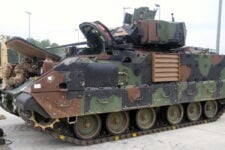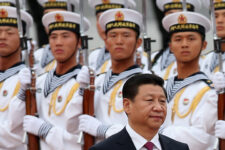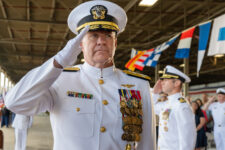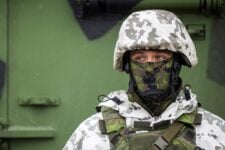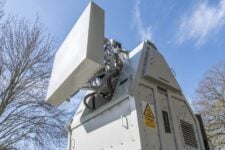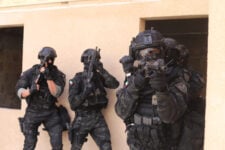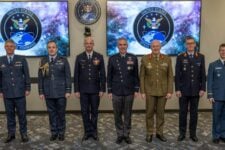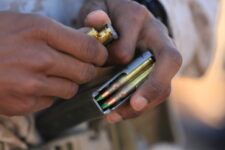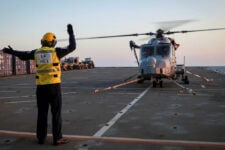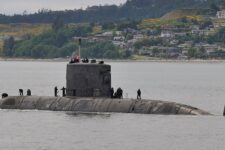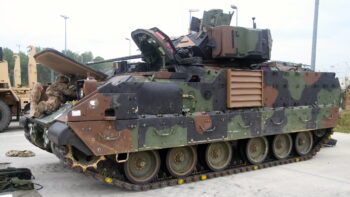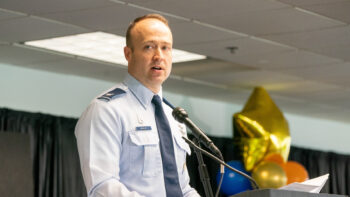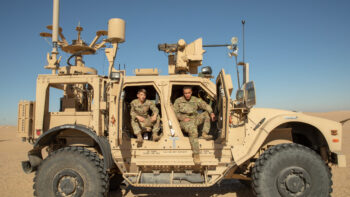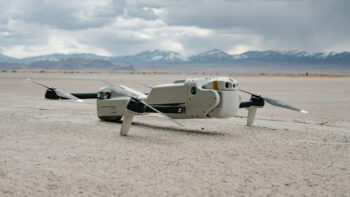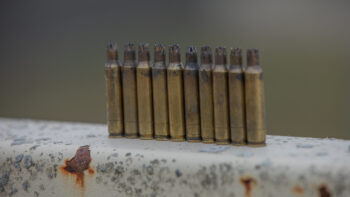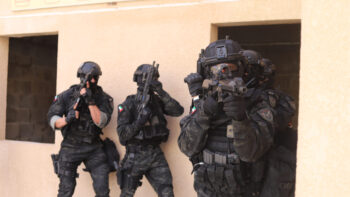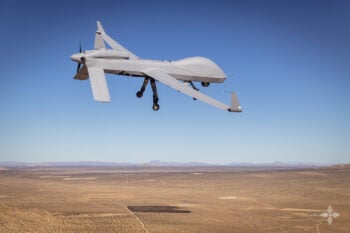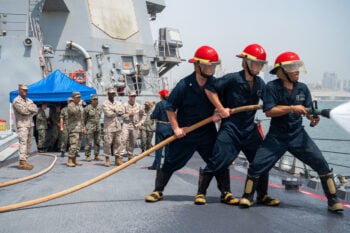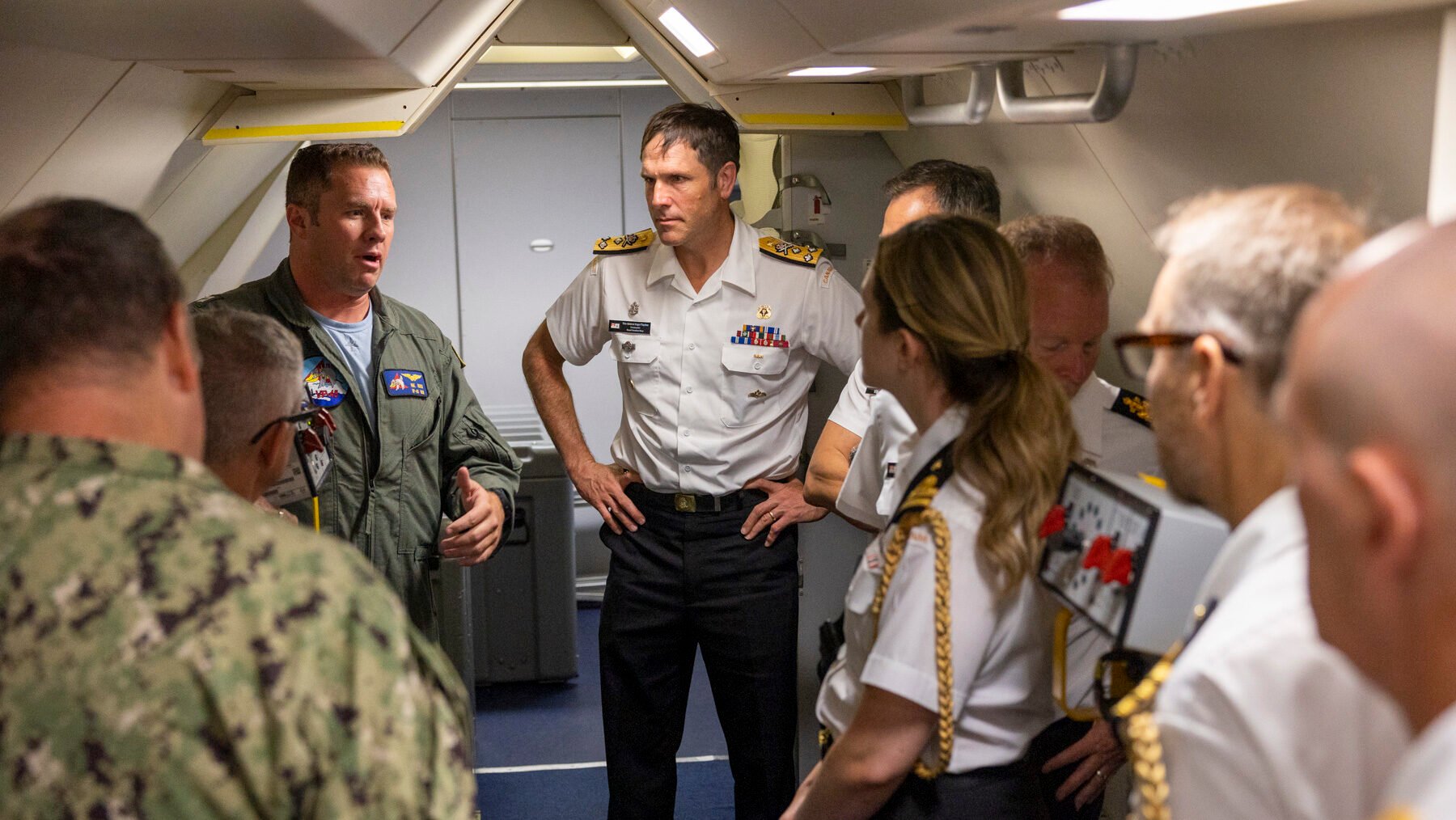
Vice Adm. Angus Topshee, commander, Royal Canadian Navy, center right, receives a tour of a P-8A Poseidon multi-mission maritime patrol and reconnaissance aircraft. (U.S. Navy photo by Chief Mass Communication Specialist Theodore Green)
WASHINGTON — The head of the Royal Canadian Navy issued a remarkably blunt and public assessment of his own fleet, citing numerous shipbuilding and recruiting issues that threaten the service’s ability to meets it obligations in the near- and long-term.
“The RCN faces some very serious challenges right now that could mean we fail to meet our force posture and readiness commitments in 2024 and beyond,” Vice Adm. Angus Topshee said in a five-minute video posted to the RCN’s YouTube channel on Monday.
Periodically switching between English and French, Topshee said the service is in a “critical state” with “many occupations experiencing [personnel] shortages at 20 percent and higher.” The admiral attributed that statistic primarily to the Canadian military’s recruiting arm failing to deliver enough recruits annually for the past 10 years.
One consequence of that is the service is currently able to deploy only one Harry DeWolfe arctic and offshore patrol vessel at a time, despite having four in the fleet and two more on the way.
“Our West Coast fleet is beset with a shortage of qualified techs constraining our ability to maintain and operate our ships and causing us to prioritize the Halifax class at the expense of the Kingston class,” he said.
With those shortages in mind, the RCN has taken up a comprehensive analysis of its occupations with the goal of determining the optimal crewing model. Topshee described that effort as a “massive undertaking” that will require “key decisions that must be made in the next two years.”
The Kingston class, made up of 12 ships, is a multi-mission coastal defense vessel. The Halifax class, also 12 ships strong, is a frigate and the only surface combatant in the Royal Canadian Navy’s fleet — that fact is not scheduled to change until around 2040 and that is a problem, Topshee added.
The Halifax class vessels, built in the late 1980s and early 1990s, are reaching the end of their predetermined service life, but the RCN is unable to retire any of the 12 frigates prior to at least four next-generation Canadian Surface Combatants coming out of production. The admiral added that he is “very confident” the first CSC will deliver in the early 2030s.
David Perry, president of the Calgary-based thinktank the Canadian Global Affairs Institute, told Breaking Defense Topshee’s video was “quite blunt,” citing the admiral’s description of his personnel shortages and how it is limiting the RCN from deploying all its available ships.
Perry also echoed Topshee’s warnings about the challenge the RCN will face in trying to keep the Halifax frigates in service until 2040.
“Keeping these ships in service is going to be very, very difficult given the age of the hull and fact that they are now past their design life,” said Perry. “They weren’t meant to keep sailing this long, never mind another [15-plus] years.”
Laser weapons and future tanks: European Defense Fund to spend $1.3B on 54 projects
Development of more novel weapon systems includes the second phase launch of the Tactical Advanced Laser Optical Systems (TALOS) project (TALOS-TWO), designed to support a long term target of developing 100 kilowatt-class laser weapons by 2030.
